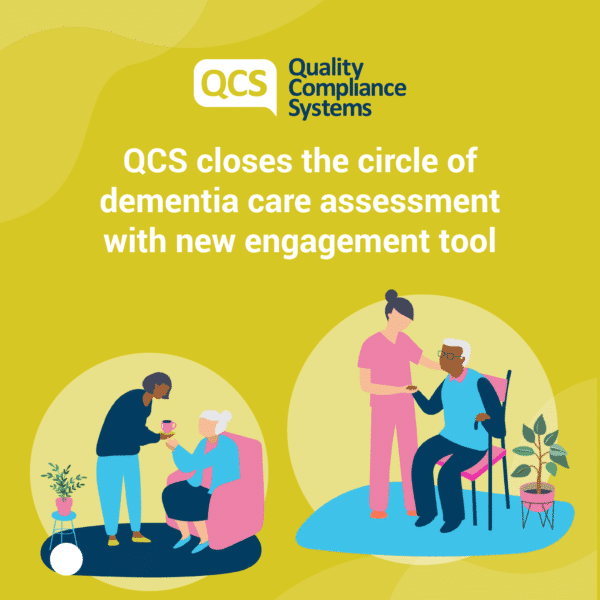Quality Compliance Systems (QCS), the leading provider of content, guidance and standards for the social care sector, has introduced its new QCS PAL Engagement Measure to its Dementia Centre resource. The tool helps carers get it right when providing person-centred care for individuals with dementia.
The QCS PAL Engagement Measure is the latest addition to the QCS Dementia Centre information and best practice resource. We have designed it to measure the level of engagement in a chosen activity for people with dementia.
The concept of meaningful engagement, I believe, matters when it comes to dementia care, and getting it right is important to the well-being of a person with dementia. But the challenges for carers are understanding what it means and how to measure whether meaningful engagement is happening.
Carers may, for example, use the QCS PAL Instrument framework to assess the level of functional and cognitive ability of each individual they are supporting. They would then design daily living and leisure activities that ensure the person can achieve their optimum level of achievement.
But how do they ensure, once they have presented the activity at the ‘just right’ functional level for that person, that they have got it right in terms of meaningful engagement too?
That’s where the new PAL engagement measure comes in – as it allows care providers and activity providers to assess if the person is fully engaged.
Understanding meaningful engagement
The ‘life history’ section within the QCS PAL Instrument is useful for gathering information such as a person’s name, their previous career history, their family and so on. But to really get a sense of who someone is, what makes them unique, we also need to include their idiosyncrasies, their habits, routines, and special ways of doing things.
These provide a foundation for a deeper engagement that I am keen to promote, with the goal of providing an individual with a strong sense of self. This is important to us all but particularly so for a person with dementia who might be losing their identity.
When we talk about creating an activity that has meaning to the individual, there are essentially two sides to the coin. Firstly, the activity should be meaningful to the person in that it makes sense to them and fits in with their way of doing things. But secondly, it should give meaning to them, to make them feel that they are significant, that they have a place, and that they have an impact on their surroundings and others in their environment.
In a care home, for example, there might be an arts and crafts group that brings together people who have been creative in the past. But one of the members previously ran the local Women’s Institute. By supporting her in leading the activity in some way, giving her the role of deciding when to schedule elements such as the coffee break, will boost her self-esteem.
Likewise, if an individual has spent her years since retirement reading the local newspaper, with a cup of coffee, while listening to ‘Popmaster’ on the radio at 10.30 every day, then it’s good to continue with this routime. Even if they are unable to read the paper, that’s not the point. It is the meaningful objects, routines and habits that provide the individual with the sense of who they are.
How to measure meaningful engagement
Thanks to its person-centered approach, the evidence-based, validated QCS PAL Engagement Measure objectively identifies the level of service the individual needs and monitors the impact of any activity provision, while promoting meaningful engagement for service users.
It does this by recording aspects of engagement in four areas: cognitive, physical, emotional and social. This is completed over a series of sessions. Carers, over time, observe an individual engaging with one particular activity and score how they are doing within the spreadsheet-based tool.
These scores produce a colour – red, amber or green – to provide a graphic visual snapshot of the engagement level of the activity. Carers can then easily identify where they should focus their efforts to help the person with dementia improve their engagement.
The tool has been purposely designed to be easy to use for practitioners. Rather than having to write long reports, they can just enter a number so it’s much quicker to record progress. This allows them more time to focus on the whole person and helps them validate what they are doing.
The benefits of meaningful engagement
The benefits of promoting meaningful engagement to the person with dementia, their close ones, care givers and care service providers are many. The person lives well for longer when their physical, emotional and cognitive well-being is improved. Care givers experience greater job satisfaction as they feel they are making a difference to people’s lives, feel valued and have a sense of purpose.
In addition, the tool shows evidence of service delivery together with the tracking of changes of an individual’s engagement over time. This provides reassurance to the individual’s family members. Close ones want to feel they have a partnership with the person’s carers, and the PAL Engagement Measure often improves the quality of their relationship with the individual with dementia too. It is also acts as confirmation to social care regulators of the use of best practice to support individuals’ participation in everyday life.
When used in conjunction with the QCS PAL Instrument and the Reflective Practice Tool, designed to enable a carer to provide exactly the right level of support across different activities, the new engagement measure completes the circle of a full appraisal process. This helps carers deliver outstanding person-centred dementia care.
The QCS PAL Engagement Measure can be found in the PAL Additional Resources section of QCS Dementia Centre.
To find out more about the QCS Dementia Centre or to purchase a subscription, please visit https://www.qcs.co.uk/dementia-centre/
You can now download the PAL Instrument for free here






